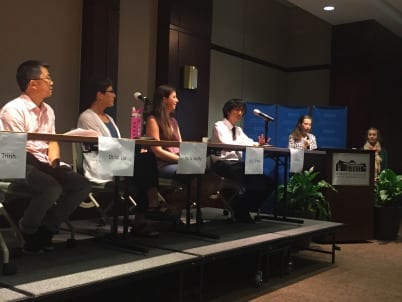Scientists discuss positives, negatives of GMOs
A group of local scientists gathered in the Baker Center of Thursday evening for “Food for Thought: GMOs.”

//Photo by Payton Boyd
Written by Payton Boyd
A group of local scientists gathered at UTK on Thursday night to dispute the positive and negative implications of using genetically modified organisms, or GMOs.
According to Elena Shpak, Dr. of Biochemistry & Cellular and Molecular Biology, “GMOs are plants that may have been genetically generated…a gene is taken from some place else and placed into bacteria, they multiply, and then it is put inside of the plant.”
As a self-titled advocate of GMOs, Shpak thinks the reason GMOs have a bad reputation is the lack of public support due to grocery stores beginning to label their produce if GMOs were used in the growth process.
Shpak told a story of the once-diminishing papaya population in Hawaii and how she felt GMOs were beneficial in resolving this issue.
The papaya population in Hawaii was attacked by a virus that was killing off the native plant when scientists decided to genetically modify the papaya. Following the modification, the genetically modified papaya was resistant to the virus and is now thriving. GMO-labeled produce inflicts fear upon shoppers who often interpret the sticker as warning not to buy the labeled items.
In dispute, UTK Graduate student David Garcia spoke about people who are fearful of GMOS, and how we should focus on learning how to destroy them.
“We don’t really know what GMOs can do to our body or biodiversity, so one of the better advancements that have come out in the last two or three years have been systems that attach survival mechanisms onto the transgenic DNA, such that if it gets out in the population, it immediately kills it,” Garcia said.
Another speaker at the event, botanist Dr. Wusheng Liu, mentioned what he felt are the benefits of using GMOs in the agriculture industry.
Liu stated that GMOs have both increased the amount of people fed and decreased the cost for farmers who grow the crops.
Dr. Amy Wolfe, leader of the Society-Technology Interactions Group at ORNL said she does not think it is wise to accept or reject the use of GMOs.
“In my experience over the years looking at a variety of different emerging technologies that could be controversial, one of the immediate responses you hear among scientists and federal agencies is that we have to educate the public, but that is not the only way to get you from extreme rejection to happy acceptance,” Wolfe said.
Featured image by Payton Boyd
Edited by Taylor Owens

